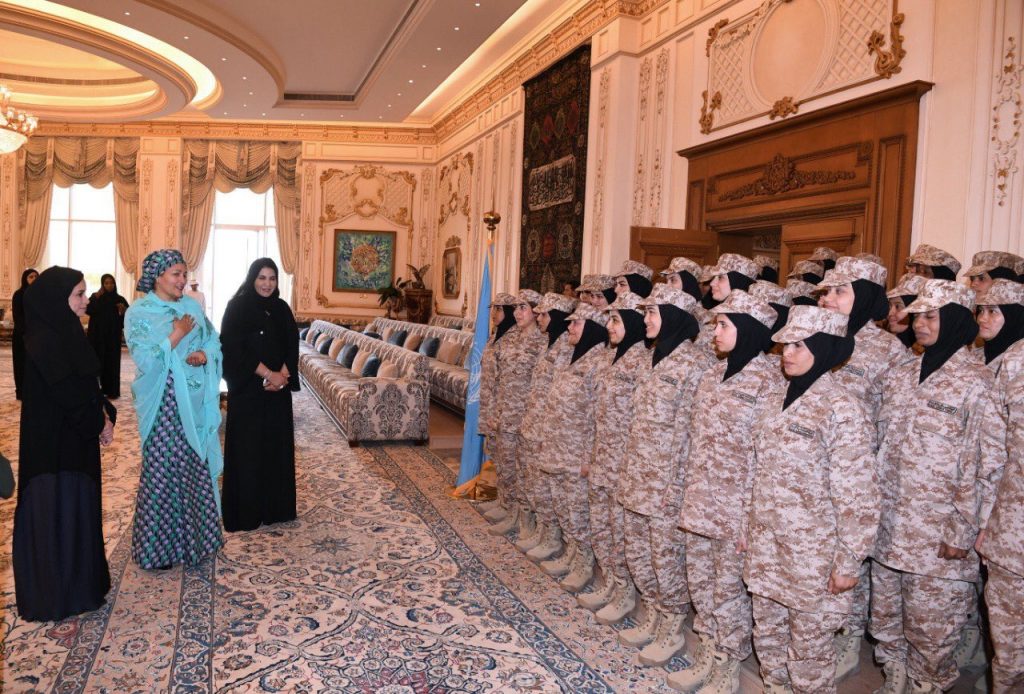The women, peace and security update

US government releases first report on WPS strategy
The Biden administration has released its first public report evaluating the implementation of the 2019 United States strategy on women, peace, and security in the departments of State, Defense and Homeland Security and the US Agency for International Development.
The report noted that a general lack of funding across government agencies for key WPS initiatives was the main challenge for implementation. It also found that many personnel didn’t have a deep understanding of WPS principles, and some lacked even basic knowledge.
The report identified opportunities for applying gender-disaggregated data and analysis to enhance the effectiveness of government initiatives, including overseas development assistance, conflict analysis, peacekeeping, police training, and programs relating gender-based violence.
In a recent article for the Council on Foreign Relations’ ‘Women around the world’ series, Valerie Hudson and Brenda Opperman highlighted the potential impact of incorporating this kind of gender-focused data analysis on the outcomes of military missions, and the untapped potential of WPS in US foreign and defence policy thinking.
Funding women in peacebuilding
On 30 June, representatives from governments, businesses and civil society assembled in Paris for the Generation Equality Forum and pledged to invest close to US$40 billion to accelerate gender parity by 2026. A portion of the funds may be used to bolster women’s participation in conflict prevention and resolution.
Writing for Foreign Policy, Marlene Spoerri maps out the importance of women’s inclusion to achieving lasting results and breaking down barriers to women’s participation in peacebuilding processes. Although traditional avenues of funding for grassroots engagement are important, Spoerri argues that there’s a need to fund initiatives such as visa assistance to enable women to participate as political decision-makers. However, she cautions that financial resourcing is not a panacea for lack of women’s engagement and should be matched with conscious efforts to enable women to lead in policymaking.
UAE launches new WPS centre of excellence
The United Arab Emirates has launched a Women, Peace and Security Centre of Excellence to support its recent action plan on UN resolution 1325. The new centre is named after the UAE’s ‘Mother of the Nation’, Sheikha Fatima bint Mubarak, who said the centre will enable international cooperation and best-practice exchanges to support women’s participation and leadership across defence and peacekeeping.
The centre will offer a range of security and peacekeeping training courses for women, including online courses designed to maximise the centre’s international reach. The UAE is the first Gulf Cooperation Council member country to adopt a WPS action plan, and while the centre is a significant symbol of the UAE administration’s commitment to raising the profile women in the security sector, it may also become a regional hub for aspiring women in other Gulf nations.
Women’s participation in countering violent extremism in Kenya
In an interview, Kenyan activist Rehema Zaid spoke with the Global Observatory’s Phoebe Donnelly about shortcomings in Kenya’s inclusion of women in preventing and countering violent extremism. Kenya’s permanent representative to the UN, Martin Kimani, cited addressing violent extremism as a top agenda item to combat insurrection attacks in the region, yet several policies supporting women’s participation in this sector have been stymied by implementation barriers.
A key barrier is a lack of funding for women’s programs, alongside practical pitfalls like poor feedback mechanisms and data collection. Persistent sexism and the perception that women are inferior to their male counterparts also hinder women’s participation in the field. The interview highlights that the challenges for women in African peacebuilding are similar to those faced in other parts of the world, raising questions about how systematic barriers can be tackled globally.
Establishing feminist foreign policy
In October 2000, the UN Security Council passed resolution 1325, recognising the links between gender equality and international peace and security. However, more than two decades later, feminist foreign policy—a framework for forming foreign policy that includes a more gender-sensitive perspective—has not been fully embraced internationally.
Sweden, Canada, France and Mexico have adopted feminist foreign policies, but many other countries have resisted. The global Covid-19 crisis has demonstrated the vulnerability of systems related to gender and exacerbated some of their effects. Nevertheless, the pandemic still provides a good opportunity for governments to reconsider their processes for policymaking. Governments need to be aware that adopting a feminist foreign policy isn’t just about including women on the agenda; the approach has to be coherent across multiple government sectors such as trade, defence and immigration.